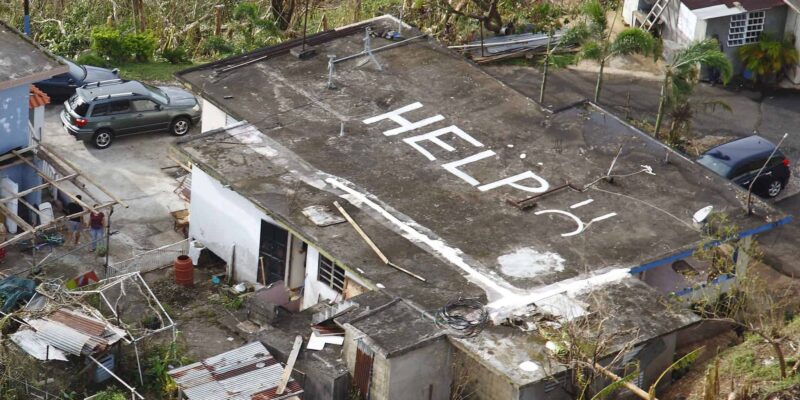Introduction
We’re living in the disaster era.
The dangerously warming climate worsens wildfires, hurricanes and floods. And for the foreseeable future, we’ve got the COVID-19 pandemic to contend with, too. All of this weighs on mental health, especially for those suffering repeat hits.
The Center for Public Integrity and Columbia Journalism Investigations joined forces with newsrooms around the country to dig into this often-forgotten part of the disaster story: There’s more to recovery than fixing damaged property.
Our partners cover regions stretching from the West Coast to Puerto Rico: California Health Report, Centro de Periodismo Investigativo, City Limits, InvestigateWest, IowaWatch, The Island Packet, The Lens, The Mendocino Voice, Side Effects Public Media and The State.
Together, we reached out to communities struck by climate disasters to learn more about the psychological impacts and what people are doing about them. Insights from more than 200 disaster survivors and mental-health professionals who took our detailed survey aided our reporting.
Here’s what we learned.
Disastrous trauma: As climate-fueled disasters mount, the only federal program to ease the emotional toll reaches just a fraction of survivors, a Public Integrity and CJI investigation found. Read more here.
The view from California, South Carolina, Iowa, Washington state: In these localizations of the national investigation, California Health Report (co-published by The Mendocino Voice) writes about the impact of repetitive fires; The Island Packet (co-published by The State) reports on repeated hurricanes; IowaWatch writes about a town trying to build back after flooding; and InvestigateWest reports on the impact of wildfires and smoke on Washington state.
How to heal after a disaster, from the people who know: We heard a lot of advice from the survivors and mental-health experts who took our survey, as well as from dozens more people who shared their hard-won expertise in interviews. Read more here. (Public Integrity)
Looks like a potluck, but it’s therapy: In a fire-prone area of Northern California, convivencias — community gatherings — provide support to Spanish-speaking disaster survivors in a comfortable setting meant to ease the stigma of mental-health care. Read more here. (Public Integrity and California Health Report)
A disaster hits, and survivors of another offer help: When a tornado tore through the small Iowa community of Parkersburg in 2008, it killed nine people, injured 70 and destroyed homes. Volunteers rushed in to help. Now Parkersburg residents are offering aid to Iowans affected by a powerful windstorm. Read more here. (IowaWatch)
A devastating flood, and long-lingering effects: Devastating Midwestern floods in 2019 overwhelmed Pacific Junction, Iowa. For one resident, the emotional impact of the flood was even tougher than losing her home. Read (and listen) about it here. (Side Effects Public Media)
Mental health after Maria: In Puerto Rico, the effects of 2017’s devastating Hurricane Maria continue to ripple. But only 18 percent of residents received counseling from a federally funded program to help survivors. And more disasters keep hitting. Read more here (in English) or here (in Spanish). (Centro de Periodismo Investigativo)
Social workers demand change: Social workers in Puerto Rico are among the first to respond after disasters. After four major ones in just three years, they’re saying that better plans are needed to help survivors with mental health — and that their profession needs a seat at the table. Read more here (in English) or here (in Spanish). (Public Integrity and Centro de Periodismo Investigativo
Haunted by wildfires, a community heals together: Washington’s Methow Valley suffered back-to-back wildfires but didn’t receive the federal disaster mental-health funding that many areas with major catastrophes get. Locals had to do the work themselves, and their efforts could guide other communities in the same situation. Read more here. (Public Integrity and InvestigateWest)
CREDITS
Reporters: Dean Russell (CJI); Jamie Smith Hopkins, Megan Cattel, Kio Herrera and Molly Taft (Public Integrity); Claudia Boyd-Barrett and Caitlin Yoshiko Kandil (California Health Report); Laura Moscoso and Cristina del Mar Quiles (Centro de Periodismo Investigativo); Sally Deneen (InvestigateWest); Suzanne Behnke and Pat Kinney (IowaWatch); Lucas Smolcic Larson (The Island Packet); Carter Barrett (Side Effects Public Media)
Engagement: Kristine Villanueva, Megan Cattel, Kio Herrera, Molly Taft and Alex Eichenstein (Public Integrity); Darian Benson (Side Effects Public Media)
Editors: Kristen Lombardi (CJI); Jamie Smith Hopkins, Chris Zubak-Skees, Jim Morris, Peter Newbatt Smith and Joe Yerardi (Public Integrity); Hannah Guzik (California Health Report); Carla Minet (Centro de Periodismo Investigativo); Robert McClure (InvestigateWest); Suzanne Behnke and Pat Kinney (IowaWatch); Kate B. Maxwell (The Mendocino Voice); Dave Rosenthal (Side Effects Public Media); Gina Smith (The State and The Island Packet)
Visuals and design: Janeen Jones (Public Integrity); Dan DeLong (InvestigateWest)
Communications: Mei Fong (Public Integrity)
Read more in Environment
Hidden Epidemics
Three years. Four disasters. Social workers in Puerto Rico want change.
They’re trying to help with the emotional toll from Hurricanes Irma and Maria, earthquakes and now COVID-19. Social workers say they need to be part of the official response.
Hidden Epidemics
How to heal emotional wounds after disaster
We heard from more than 200 disaster survivors and people helping them. Here’s what we learned.


Join the conversation
Show Comments